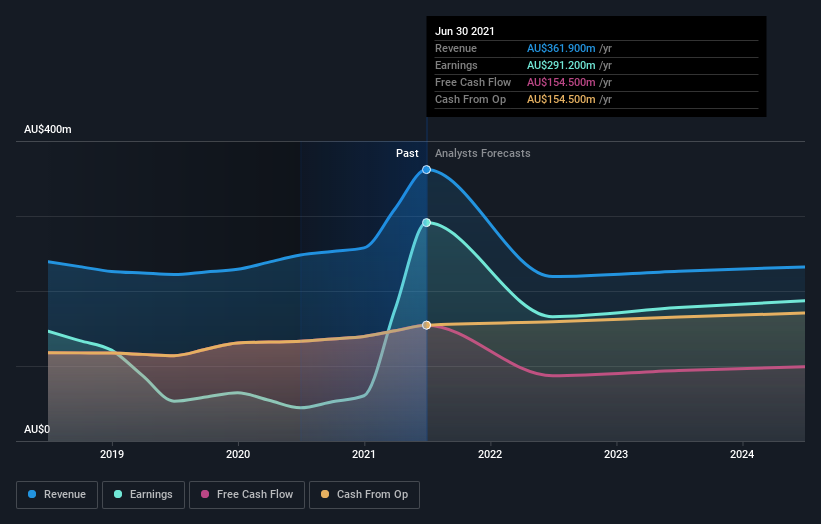Here's What Charter Hall Retail Real Estate Investment Trust's (ASX:CQR) Shareholder Ownership Structure Looks Like
If you want to know who really controls Charter Hall Retail Real Estate Investment Trust (ASX:CQR), then you'll have to look at the makeup of its share registry. Large companies usually have institutions as shareholders, and we usually see insiders owning shares in smaller companies. Companies that have been privatized tend to have low insider ownership.
Charter Hall Retail Real Estate Investment Trust has a market capitalization of AU$2.4b, so we would expect some institutional investors to have noticed the stock. In the chart below, we can see that institutional investors have bought into the company. Let's delve deeper into each type of owner, to discover more about Charter Hall Retail Real Estate Investment Trust.
See our latest analysis for Charter Hall Retail Real Estate Investment Trust
What Does The Institutional Ownership Tell Us About Charter Hall Retail Real Estate Investment Trust?
Institutions typically measure themselves against a benchmark when reporting to their own investors, so they often become more enthusiastic about a stock once it's included in a major index. We would expect most companies to have some institutions on the register, especially if they are growing.
We can see that Charter Hall Retail Real Estate Investment Trust does have institutional investors; and they hold a good portion of the company's stock. This suggests some credibility amongst professional investors. But we can't rely on that fact alone since institutions make bad investments sometimes, just like everyone does. It is not uncommon to see a big share price drop if two large institutional investors try to sell out of a stock at the same time. So it is worth checking the past earnings trajectory of Charter Hall Retail Real Estate Investment Trust, (below). Of course, keep in mind that there are other factors to consider, too.
Investors should note that institutions actually own more than half the company, so they can collectively wield significant power. Hedge funds don't have many shares in Charter Hall Retail Real Estate Investment Trust. The Vanguard Group, Inc. is currently the company's largest shareholder with 9.0% of shares outstanding. For context, the second largest shareholder holds about 7.5% of the shares outstanding, followed by an ownership of 6.4% by the third-largest shareholder.
Our studies suggest that the top 25 shareholders collectively control less than half of the company's shares, meaning that the company's shares are widely disseminated and there is no dominant shareholder.
While it makes sense to study institutional ownership data for a company, it also makes sense to study analyst sentiments to know which way the wind is blowing. Quite a few analysts cover the stock, so you could look into forecast growth quite easily.
Insider Ownership Of Charter Hall Retail Real Estate Investment Trust
The definition of an insider can differ slightly between different countries, but members of the board of directors always count. Management ultimately answers to the board. However, it is not uncommon for managers to be executive board members, especially if they are a founder or the CEO.
Insider ownership is positive when it signals leadership are thinking like the true owners of the company. However, high insider ownership can also give immense power to a small group within the company. This can be negative in some circumstances.
Our information suggests that Charter Hall Retail Real Estate Investment Trust insiders own under 1% of the company. It is a pretty big company, so it would be possible for board members to own a meaningful interest in the company, without owning much of a proportional interest. In this case, they own around AU$4.5m worth of shares (at current prices). It is always good to see at least some insider ownership, but it might be worth checking if those insiders have been selling.
General Public Ownership
The general public, with a 36% stake in the company, will not easily be ignored. While this size of ownership may not be enough to sway a policy decision in their favour, they can still make a collective impact on company policies.
Next Steps:
It's always worth thinking about the different groups who own shares in a company. But to understand Charter Hall Retail Real Estate Investment Trust better, we need to consider many other factors. Like risks, for instance. Every company has them, and we've spotted 2 warning signs for Charter Hall Retail Real Estate Investment Trust (of which 1 is a bit concerning!) you should know about.
If you are like me, you may want to think about whether this company will grow or shrink. Luckily, you can check this free report showing analyst forecasts for its future.
NB: Figures in this article are calculated using data from the last twelve months, which refer to the 12-month period ending on the last date of the month the financial statement is dated. This may not be consistent with full year annual report figures.
This article by Simply Wall St is general in nature. We provide commentary based on historical data and analyst forecasts only using an unbiased methodology and our articles are not intended to be financial advice. It does not constitute a recommendation to buy or sell any stock, and does not take account of your objectives, or your financial situation. We aim to bring you long-term focused analysis driven by fundamental data. Note that our analysis may not factor in the latest price-sensitive company announcements or qualitative material. Simply Wall St has no position in any stocks mentioned.
Have feedback on this article? Concerned about the content? Get in touch with us directly. Alternatively, email editorial-team (at) simplywallst.com.

 Yahoo Finance
Yahoo Finance 

